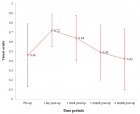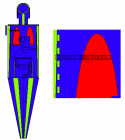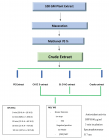About Dokuz Eylul University
Dokuz Eylul University
Articles by Dokuz Eylul University
The effects of boric acid and disodium pentaborate dechydrate in metastatic prostate cancer cells
Published on: 15th July, 2022
Boron and their derived molecules have prevention or treatment potential against prostate cancer. In this study, we aim to investigate the effects of Boric acid (BA) and Disodium Pentaborate Dechydrate (DPD) in metastatic prostate cancer cells such as DU-145 which is brain metastatic prostate cancer, and PC3 which is bone metastatic prostate cancer.Metastatic human prostate cancer cell lines, PC-3 and DU-145, were used to show whether inhibition effects of BA and DPD on prostate cancer cells in this study. BA and DPD were applied for 24 hours to the cells. Cell viability determination was performed using WST-1 assay. Apoptotic cell death was evaluated with Annexin-V/PI flow cytometric analysis and caspase-3 expression immunohistochemically. A wound healing assay was also used to measure cancer cell migration after exposure to BA and DPD.Applying BA and DPD made inhibition of cell proliferation in both BA (1 mM) and DPD (7 mM) at 24 h. The results of Annexin-V/PI showed that DPD induced higher levels of apoptosis than BA in both prostate cancer cells. Caspase-3 expressions were also higher than BA with DPD in both metastatic prostate cancer cells. We evaluated cell migration using a wound healing assay and the result showed that cell migration was inhibited with BA and DPD in both cells. Both BA and DPD inhibited the cell viability of metastatic prostate cancer cells. Apoptotic cell death with applying DPP had a higher rate than BA treatment. Moreover, BA and DPD inhibited cell migration in both cells when we compared them with control. This study’s results showed that BA and DPD of boron derivates significantly induced cells to apoptosis and the migration was inhibited by the derived form of boron in metastatic prostate cancer cells.
The effects of boric acid and disodium pentaborate dechydrate in metastatic prostate cancer cells
Published on: 15th July, 2022
Boron and their derived molecules have prevention or treatment potential against prostate cancer. In this study, we aim to investigate the effects of Boric acid (BA) and Disodium Pentaborate Dechydrate (DPD) in metastatic prostate cancer cells such as DU-145 which is brain metastatic prostate cancer, and PC3 which is bone metastatic prostate cancer.Metastatic human prostate cancer cell lines, PC-3 and DU-145, were used to show whether inhibition effects of BA and DPD on prostate cancer cells in this study. BA and DPD were applied for 24 hours to the cells. Cell viability determination was performed using WST-1 assay. Apoptotic cell death was evaluated with Annexin-V/PI flow cytometric analysis and caspase-3 expression immunohistochemically. A wound healing assay was also used to measure cancer cell migration after exposure to BA and DPD.Applying BA and DPD made inhibition of cell proliferation in both BA (1 mM) and DPD (7 mM) at 24 h. The results of Annexin-V/PI showed that DPD induced higher levels of apoptosis than BA in both prostate cancer cells. Caspase-3 expressions were also higher than BA with DPD in both metastatic prostate cancer cells. We evaluated cell migration using a wound healing assay and the result showed that cell migration was inhibited with BA and DPD in both cells. Both BA and DPD inhibited the cell viability of metastatic prostate cancer cells. Apoptotic cell death with applying DPP had a higher rate than BA treatment. Moreover, BA and DPD inhibited cell migration in both cells when we compared them with control. This study’s results showed that BA and DPD of boron derivates significantly induced cells to apoptosis and the migration was inhibited by the derived form of boron in metastatic prostate cancer cells.
Evaluation of Soil Water Characteristic Curves of Boron added Sand-bentonite Mixtures using the Evaporation Technique
Published on: 25th April, 2024
Compacted bentonite or sand-bentonite mixtures are considered buffer/backfill materials in the engineering barriers of deep geological repositories for high-level nuclear waste (HLW) disposal in many countries. The design and long-term functionality of nuclear repositories have critical importance for environmental safety and public health. The initially unsaturated buffer material could become re-saturated long after following the sealing of the repository. Although the saturation degree of the buffer might decrease due to high temperatures and evaporation, it tends to increase with groundwater intrusion. Therefore, the soil water characteristic curves (SWCCs) for these unsaturated soils are a key factor in geotechnical engineering. Yet, the determination of SWCCs can be time-consuming and prone to inaccuracies. The HYPROP (Hydraulic Property Analyzer) evaporation technique is a preferred method for accurately determining water retention curves of soils. This reliable method was applied to estimate the water retention curves for sand-bentonite mixtures in the presence of boron minerals. Known for their minimal thermal expansion and commonly used in various industries, boron minerals may improve the thermal stability of sand-bentonite mixtures. The findings revealed that the boron addition increased the water retention capacity of the 10% bentonite mixtures but had a negligible impact on the 20% bentonite mixtures.

HSPI: We're glad you're here. Please click "create a new Query" if you are a new visitor to our website and need further information from us.
If you are already a member of our network and need to keep track of any developments regarding a question you have already submitted, click "take me to my Query."
























































































































































